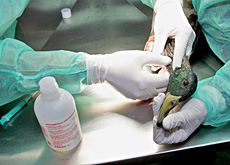Flu database pools pandemic knowhow

Switzerland is to host a new global influenza database aimed at boosting efforts to prevent a human bird flu pandemic.
Access to the information system, which will be launched next month and managed by the Swiss Institute of Bioinformatics (SIB), will be unrestricted and free of charge.
The move follows an agreement struck between the institute and the Global Initiative on Sharing Avian Influenza Data (GISAID).
GISAID was set up in August last year by a group of leading medical researchers concerned at the lack of transparency and limited access to influenza data.
“Our goal is to assist public health and veterinary authorities around the world to analyse human and animal influenza outbreaks, enhancing the ability of national and international health authorities to respond quickly to threats posed by these viruses,” SIB director Ernest Feytmans said in a statement.
Switzerland’s long-standing tradition of neutrality and the presence of the World Health Organization in Geneva helped to clinch the deal, according to those behind the venture.
The partnership is being supported by the State Secretariat for Education and Research and the Federal Health Office, which provided preliminary funding for the project. Lausanne-based biotech company SmartGene has developed the system for hosting and analysing the data.
User agreement
Those using the database will have to register and adhere to a set of rules covering shared use of the information.
Lydie Bougueleret, operations director of the institute’s renowned protein database, told swissinfo that the user agreement would be strictly enforced to prevent data being misused.
The project’s backers believe this common-access approach will allow the technology to be used both for research and the rapid development of products such as diagnostics, antiviral drugs and vaccines.
The database will contain genetic sequence data on flu strains collected around the world, thereby offering a global view of the way the virus spreads and mutates.
Bougueleret said that while it was important to have this information publicly available, the main benefit was that contributors could post gene sequences as soon as they emerged.
This would enable other researchers to check their own analysis against available data and ensure quicker scientific progress.
The WHO, which has not been involved in the project, said any venture that improved pandemic preparedness had to be welcomed.
“The idea of sharing information to develop and refine the response to pandemic influenza is going to be important,” said WHO spokesman Dick Thompson.
swissinfo, Adam Beaumont
The Global Initiative on Sharing Avian Influenza Data is backed by over 70 leading scientists, including seven Nobel laureates.
There is another flu database at the Los Alamos National Laboratory in New Mexico, but a subscription is needed for full access.
The Swiss Institute of Bioinformatics is an academic not-for-profit foundation that has a long-standing tradition of producing carefully annotated databases.
The SIB also includes world-class research groups in the fields of proteomics, comparative genomics, molecular evolution and protein structure prediction, all of which are relevant to the analysis of influenza data.

In compliance with the JTI standards
More: SWI swissinfo.ch certified by the Journalism Trust Initiative










You can find an overview of ongoing debates with our journalists here . Please join us!
If you want to start a conversation about a topic raised in this article or want to report factual errors, email us at english@swissinfo.ch.